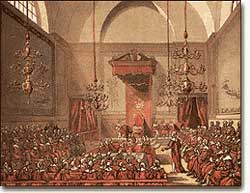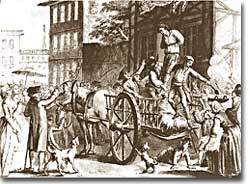

Britain's House of Lords, the upper house of Parliament, helped issue a series of acts in response to the Boston Tea Party and the American colonies' continual rebellion.
Parliament was fed up with the colonists' rebellion. They had tolerated the protest letters and trade boycotts. They put up with harassment of their customs officials — at least at first. But Parliament's tolerance was tested by the Boston Tea Party incident. When they heard that 342 chests of tea belonging to the British East India Company were destroyed, they took action.
"The Americans have tarred and feathered your subjects, plundered your merchants, burnt your ships, denied all obedience to your laws and authority; yet so clement and so long forbearing has our conduct been that it is incumbent on us now to take a different course. Whatever may be the consequences, we must risk something; if we do not, all is over."

Colonists sometimes took out their anger over unfair taxes on the tax collector, as depicted in this drawing from 1774.
For some reason, Parliament seemed to pass law after law intended to provoke the colonists in these years. Right after passing the Coercive Acts, it passed the Quebec Act, a law that defined the terms of the government of the colony. The law declared the Roman Catholic Church was the official church in Quebec. It also said that an appointed council, rather than an elected body, would make the major decisions for the colony. The boundary of Quebec was extended into the Ohio Valley. This land had previously been promised to the American colonies.
After the Quebec Act was passed, rage spread through the 13 American colonies. By writing this one law, the British Crown gave the land to the French still living in North America. This was land that was clearly desired by the American colonists. By giving control to Catholics, Parliament was also showing the limits of Protestant America. The Quebec Act also established something called "direct rule." Under direct rule, the British government had tight control over the colony. The American colonists believed that both the Coercive Acts and the Quebec Act were formed to anger them. Among the colonists, the laws were collectively called the Intolerable Acts. Throughout the colonies, the message was clear: what happened in Massachusetts could happen anywhere. But the British had gone too far. The other twelve colonies began to provide support to Massachusetts by sending them supplies. Finally, for the first time since the Stamp Act crisis, a conference was called. Representatives of twelve colonies planned a journey to Philadelphia.